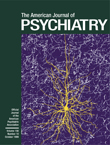To the Editor: Sexual dysfunction is one of the more common and troublesome side effects associated with serotonergic antidepressants, particularly selective serotonin reuptake inhibitors (SSRIs). It frequently results in switching, discontinuation, or dose reductions to ineffective levels of the prescribed antidepressant. Approximately 50% of patients reportedly experience some degree of sexual dysfunction with SSRIs
(1); the most common complaints in women include lessened libido, difficulty with lubrication, dyspareunia, and anorgasmia. Control of iatrogenic sexual dysfunction could improve treatment effectiveness by increasing compliance and decreasing relapse or recurrence.
Sildenafil citrate, a peripherally acting selective inhibitor of type V cyclic guanosine-monophosphate-specific phosphodiesterase, is approved as an effective oral treatment for a diverse etiologic spectrum of male erectile dysfunction
(2). It acts at the penis on nitric oxide transmission, stimulating cyclic guanosine monophosphate formation by inhibiting its catabolism. Reports of women taking sildenafil describe increased vaginal blood flow, enhanced clitoral responsiveness, and increased vaginal lubrication
(3). We report on the use of sildenafil in an open study of 10 female patients who developed symptoms of sexual dysfunction as a consequence of treatment with antidepressants.
Ten patients were recruited from outpatient psychiatry clinical settings at the University of New Mexico and Texas Tech University Schools of Medicine. Clinicians were asked to identify female patients, age 18 to 60 years, who provided oral informed consent, who were in stable relationships, who had normal premorbid sexual function, and who had developed sexual dysfunction, particularly anorgasmia, with or without other sexual disturbances (i.e., loss of libido, lubrication difficulties, uncomfortable or painful intercourse) while being effectively treated with a thymoleptic. The subjects had to be taking the antidepresssant for at least 6 weeks, currently receiving a stable dose and showing improvement of the presenting condition (usually depression, anxiety, or both), and experiencing sexual side effects continuously for more than 4 weeks. Exclusion criteria were concurrent unstable medical illness, poor overall physical health, history of sexual dysfunction (other than antidepressant-induced), psychiatric disorder not under control, previous or current alcohol or substance abuse or dependence, diabetes mellitus, neurological disorder, or genital anatomical defects. A history of stroke, myocardial infarction, or use or likely use of any nitrate caused a subject to be explicitly excluded. Treatment was provided in the context of the subjects’ ongoing clinical care and was approved by the hospital’s institutional review board.
Each patient was given three 50-mg tablets of sildenafil and instructed to take one 50-mg tablet no more than 2 hours or less than 1 hour before anticipating sexual intercourse. If sildenafil was unsuccessful in reversing the sexual dysfunction, the patient was instructed to take 100 mg (two tablets) in the same time frame before the next anticipated sexual encounter. Nine of the 10 identified patients took sildenafil and reported a complete or very significant reversal of their sexual dysfunction. This included return of effective duration and intensity of adequate arousal, lubrication, and orgasmic function.
This report adds to previous findings of the reversal of male sexual dysfunction with sildenafil
(2). These women developed sexual dysfunction as a side effect of prescribed antidepressant treatment. In several cases, the initial antidepressant was changed, but sexual dysfunction recurred with the second agent. Sildenafil was consistently effective in improving these iatrogenic adverse effects. In addition, the patients were able to continue the same thymoleptic regimen that improved their current illness. With the exception of occasional mild transient headache or dizziness, no other significant side effects were observed with brief sildenafil treatment.
Sildenafil seems to be an effective intervention for SSRI- and other thymoleptic-induced sexual dysfunction and offers new approaches over generally ineffective strategies with serotonin antagonists (cyproheptadine), cholinergic agonists (bethanechol, neostigmine), α2-antagonists (yohimbine), herbal treatments (ginkgo biloba), dose reduction, and drug holiday. Effective management of iatrogenic sexual dysfunction can positively affect treatment outcome by improving compliance and reducing the attendant morbidity and mortality of the disorders for which the agents are prescribed but too commonly discontinued. To be determined is whether sildenafil’s reversal of sexual side effects caused by antidepressants continues with long-term use for persistent sexual dysfunction. Further study and replication of these findings in randomized placebo comparison trials are necessary and are in process.

